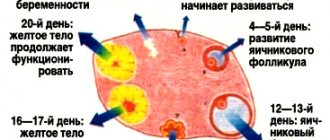Many women experience mood swings and other psychological symptoms before menstrual bleeding begins. In most cases, such problems manifest themselves in a mild form and do not affect the quality of life, but in some cases they not only prevent women from performing their daily tasks, but also negatively affect their relationships with others.
In this article, we will outline the reasons for the development of mood swings before the onset of menstruation, and also list other symptoms that can manifest themselves during this phase of the menstrual cycle. We will also provide information about available treatments for emotional disorders and explain when women should see a doctor.
Menstrual cycle: when to expect trouble?
So, you already know that your menstrual cycle includes five phases: menstrual, follicular, ovulation phase, corpus luteum (progesterone) phase and premenstrual phase. These are periods of hormonal changes in the body, along with which your overall well-being changes. Knowing the characteristics of your body, you can prepare for the most unfavorable periods.
"Shift" in phase
Your menstrual cycle is formed with the help of two types of sex hormones - estrogen and progesterone. Increased secretion of estrogen begins after menstruation (menstrual phase) and lasts on average 8-10 days. During this time, the next female reproductive cell, the follicle, matures. This phase of the menstrual cycle is called follicular (it ends at the moment when ovulation occurs).
The ovulation phase does not last long while the egg moves through the fallopian tubes. At the site of the burst follicle, where the egg “lived,” the so-called corpus luteum (corpus luteum phase) is formed, which produces the hormone progesterone in preparation for a possible pregnancy. The average duration of progesterone production is about 10 days. If fertilization does not occur, the corpus luteum is destroyed, the production of hormones decreases, which leads to a deterioration in the general condition. This is the premenstrual phase, which lasts on average 3-4 days. Then comes menstruation.
Causes of depression during menstruation
Premenstrual syndrome occurs during menstruation. This condition is characterized by a complex of unpleasant symptoms. The main symptoms include malaise, decreased performance, and headaches. Depression during periods is also common.
Changes in the psycho-emotional background are caused by hormonal fluctuations. It is during menstruation and shortly before it that a woman needs more attention to herself. Treatment of depression should be comprehensive. The most appropriate therapy is selected by the doctor after diagnosis.
It is allowed to use both medicinal and traditional methods.
Girls often complain about symptoms of premenstrual syndrome.
What are the causes of depression during menstruation?
The main root causes of depression before and during menstruation are described in the table.
| Hormonal changes | After ovulation, the amount of estrogen decreases. For this reason, the psycho-emotional state becomes unstable. Irritability and aggressiveness appear. The level of serotonin decreases intensively. It is this component that is responsible for a good mood. During menstruation, feelings of weakness and fatigue prevail. |
| Avitaminosis | Poor nutrition, in which the body does not receive enough of the required vitamin and mineral complexes, can also cause depression. Deficiency of magnesium and B vitamins has the most negative impact. They affect the performance of the nervous system. |
| Stressful situations | With PMS, a woman cannot control herself. Any stressful situations and stress negatively affect the girl’s condition. Resistance to emotional fluctuations decreases. |
| Mental instability | Girls with unstable mental health are most susceptible to depression. The susceptibility to depression increases in the second half of the menstrual cycle. |
| Thyroid disorders | Such diseases negatively affect the performance of the entire endocrine system. This also affects the psycho-emotional state. |
Women are most susceptible to developing depression in the autumn-winter period. It is at this time that there is a lack of light. There is a loss of strength and mood.
Typically, depression during menstruation does not pose a serious danger. It is enough to reconsider your lifestyle and adjust your diet. Rarely is it necessary to take medications or alternative medicine.
Depression can occur for various reasons
There is an increased risk of depression if you are in poor health. The disorder is usually encountered by women who already have underlying diseases.
What symptoms accompany depression?
The manifestation of depression is individual. Often women experience excessive irritability and tearfulness. There is no desire to interact with the outside world. The woman tries to go out and contact people as early as possible.
The most common signs include:
- regular migraines;
- the appearance of tearfulness for any reason;
- increased nervousness and irritability;
- uncontrolled aggression;
- sleep disturbance in the form of insomnia;
- decreased concentration;
- eating disorder;
- weakness;
- excessive fatigue;
- absent-mindedness;
- increased requirements for physical comfort in the form of intolerance to loud sounds or intense light;
- memory impairment.
The woman may have aggressive behavior
The woman’s well-being is greatly deteriorating. The girl temporarily stops thinking specifically and that is why she can cling to little things. From time to time, a representative of the fairer sex may experience fever and fever.
A girl can make higher demands on herself. Without treatment, the condition gradually worsens. A bad mood can become permanent.
A woman may develop a number of complexes. Headaches become constant. The craving for sweets and fatty foods increases. The mammary glands are overly sensitive. Any touch causes discomfort.
How are medications used for treatment?
The most effective way to combat depression is to take medications. Only a doctor can select effective medications after diagnosis. This will help eliminate possible contraindications and side effects.
It is recommended to use special medications to treat depression
Most often, women are prescribed for treatment:
- antidepressants;
- sedatives;
- hormonal drugs;
- drugs to stabilize blood circulation in the brain;
- vitamin and mineral complexes.
Drugs are recommended only as a last resort. First of all, you need to resort to proper nutrition and a healthy lifestyle. Medicines are taken after consultation with a doctor. Otherwise, side effects cannot be avoided.
You cannot change the dosage of the selected medications on your own. Otherwise, addiction is likely to occur.
How are traditional methods used?
It is safer to use non-traditional methods of treatment. In this case, you can get rid of depression with minimal consequences for the body. It is tinctures and decoctions that help restore the functioning of the nervous system in a short time. In addition, they normalize sleep and eliminate excess excitability.
You can prepare soothing decoctions at home
It is recommended to prepare decoctions and tinctures based on lemon balm, chamomile, and mint. You should first consult a doctor to exclude the possibility of individual intolerance to a natural medicine.
It is recommended to take relaxing baths. To do this, add sea salt or natural oils to the water:
- lavender;
- citrus fruits;
- lemon balm.
Relaxing baths are recommended to be used before bedtime. This treatment helps restore sleep from the first use. If any natural medicine is used incorrectly, the risk of the following unpleasant symptoms increases:
- nausea;
- dizziness;
- weakness;
Allergic itching is possible when taking herbs
- skin rashes;
- itching;
- headache;
- apathy.
If you have these symptoms, choose a different treatment.
How to change your diet
Depression is often the result of poor nutrition. The body does not receive the required amount of vitamins and microelements. The diet should be enriched with foods rich in B vitamins, namely:
- dairy products;
- fish;
- eggs;
- bananas;
- apples;
- dried apricots.
Limit your coffee consumption. It’s better to give it up altogether. Consume bran daily.
For information about the characteristics of psychosis and depression during premenstrual syndrome, watch this video:
Shortly before menstruation, excess fluid begins to be retained. This is why it is important to drink about 2 liters of clean water. The daily diet should contain as little salt and additional low-quality seasonings as possible.
To remove excess fluid and prevent depression, drink diuretic decoctions based on rose hips and parsley. These drinks should be drunk daily in moderation.
How to make lifestyle changes to combat depression
To combat depression, a woman should lead an active lifestyle. You need to do moderate physical activity every day. If you don't want to exercise, give preference to quick walks.
Yoga has the greatest benefits for women. This sport helps you cope with stressful situations and improve your health. Doctors also recommend not holding back your emotions. There is no need to accumulate them. In stressful situations, you can, for example, break dishes or scream. You also need to find yourself a favorite activity, for example, sewing, embroidery, knitting, etc.
It is recommended to quit smoking
You need to give up bad habits. Get rid of addictions to smoking or drinking alcoholic beverages. You can give preference to meditation.
Source: https://mesyachnie.com/informacija/depressija.html
Caution: the reaction is unpredictable!
During the menstrual phase, your body absorbs oxygen worse, the number of heartbeats increases, breathing quickens, and strength and endurance deteriorate. Try to walk more in the fresh air to increase the supply of oxygen to your tissues. Your diet should include plenty of calcium, magnesium and iron. After menstruation, the content of hormones increases, which improves the functioning of the brain, cardiovascular system, and performance increases. But after a few days, when the egg matures, the concentration of hormones begins to fall. In this regard, the level of energy metabolism decreases. This leads to a decrease in performance, reduced immunity, worsening health and deterioration of mood. These days, it’s better not for anyone to fall under your “hot” hand! If you cannot control attacks of “bad” mood, take tincture of valerian and motherwort. Avoid heavy foods by replacing dinner with fruits and vegetable salads.
Treatment for depression during menstruation
Depression during menstruation manifests itself in fatigue, obsessive negative thoughts, sleep disturbances and other unpleasant symptoms. Many women have long perceived this condition during menstrual periods as normal, but this can and should be fought.
Symptoms of depression
Premenstrual depression, or PMS syndrome, supposedly occurs 5-14 days before the onset of menstruation. It is expressed in increased nervousness, irritability, and conflict. Even an insignificant event can cause a strong emotional outburst in a woman and cause tears. The general clinical picture of premenstrual syndrome is expressed in:
- loss of appetite;
- difficulties in decision making;
- forgetfulness and absent-mindedness;
- feeling of unreasonable anxiety;
- anger and tension;
- increased sensitivity to sharp sounds and smells;
- desire to be alone;
- sleep disturbance;
- impaired concentration;
- insurmountable laziness.
Changes are observed not only psychologically, but also physically. Namely:
- joint pain;
- feeling of fullness in the eyes;
- weight gain, which is explained by fluid retention in the body;
- bloating;
- feeling of nausea;
- numbness of the limbs;
- breast swelling;
- heartache;
- migraine.
External manifestations of PMS and depression during menstruation also occur. A woman stops taking care of herself - even primitive hair washing turns into an impossible task. The back slouches, the gait slows down, the legs barely drag.
Experts distinguish between several degrees of severity of depression and PMS: mild (with 3-4 symptoms) and severe (5-12 symptoms). Particularly complex forms can lead a woman to premenstrual dystrophy, which almost completely impairs her ability to work.
After menstruation, all symptoms disappear, the woman’s physical and psychological state returns to normal.
Through long-term observations, experts have identified three types of depression in women:
- compensated (when the disease does not progress);
- subcompensated (every year the symptoms become brighter, and the general clinic expands);
- decompensated (the duration of the depressive state increases and is no longer limited to standard periods).
The exact cause of depression during menstruation has not been identified to this day; there is only a theory. The first description of such a condition dates back to 1931.
At that time, PMS was explained by high levels of estrogen in the blood, but a little later, experts put forward a version of a decrease in progesterone, which occurs in the second half of the cycle.
With a large number of theories about the causes of premenstrual syndrome, most of them come down to changes in hormone levels. This is confirmed by the fact that depression does not occur during the perinatal period and menopause.
There are opinions that connect PMS with the functioning of the brain, as well as with a woman’s lifestyle. Those ladies who are regularly exposed to stress and infectious diseases more often suffer from premenstrual syndrome and their symptoms are much more pronounced.
The risk group includes women with chronic diseases of internal organs who do not follow the rules of a balanced diet. It has been experimentally observed that symptoms intensify with heavy consumption of alcohol, caffeinated drinks, and salty foods.
Premenstrual syndrome can be inherited from mother to daughter.
How to deal with depression during your period
You can reduce the severity and duration of depression by making slight lifestyle changes. You need to start with correcting your diet. Eating small meals frequently will help avoid bloating and heaviness in the stomach.
It is better to avoid foods that retain fluid in the body altogether. The inclusion of carbohydrates in the diet, which are found in sufficient quantities in vegetables, fruits and cereals, will have a positive effect on your physical condition.
You need to forget about alcohol and coffee completely.
Even light physical activity has a good effect on a woman’s condition. Regular walks in the fresh air, dancing, morning jogging, swimming and other activities contribute to the production of the hormone serotonin. The latter is responsible for the psychological state of a person, making him happy.
If you don’t have the strength to fight the disease on your own, you should seek help from a gynecologist-endocrinologist. He will conduct an examination, prescribe tests, based on the results of which he will draw up an effective treatment plan. Therapy includes taking hormonal, diuretic and anti-inflammatory medications, as well as antidepressants.
Prevention of depression
To reduce the severity of depression during menstruation, it is useful to engage in prevention. The latter includes several main points:
- Proper nutrition. You should remove harmful foods and dishes from your diet, filling the table with valuable sources of vitamins and microelements.
- Favorite activities. It is necessary to promote the production of the hormone serotonin in every possible way. Engaging in your favorite hobby, watching humorous films and programs, chatting with friends and much more that evokes pleasant feelings and vivid emotions contributes to a good mood.
- Rest. Strong physical and mental stress, stress does not have the best effect on health. No matter how busy your schedule is, you definitely need to find time to relax. It is better to regularly go to deserted places, into nature and turn off all means of communication.
- Easy attitude to life. Worrying about any reason is a direct road to real protracted depression. Sometimes you should rely on chance and not take problems too seriously.
PMS is not a death sentence, and although it is impossible to completely get rid of it, it is possible to reduce its intensity to the point that a woman does not feel its influence. The main thing is to take action in time: follow the rules of a healthy lifestyle and establish harmony of soul and body.
Source: https://mypsihologiya.ru/depressiya/lechenie-depressii-vo-vremya-mesyachnyh
What is the cause of depression during menstruation?
The exact cause of depression during menstruation has not been identified to this day; there is only a theory. The first description of such a condition dates back to 1931.
At that time, PMS was explained by high levels of estrogen in the blood, but a little later, experts put forward a version of a decrease in progesterone, which occurs in the second half of the cycle.
With a large number of theories about the causes of premenstrual syndrome, most of them come down to changes in hormone levels. This is confirmed by the fact that depression does not occur during the perinatal period and menopause.
There are opinions that connect PMS with the functioning of the brain, as well as with a woman’s lifestyle. Those ladies who are regularly exposed to stress and infectious diseases more often suffer from premenstrual syndrome and their symptoms are much more pronounced.
The risk group includes women with chronic diseases of internal organs who do not follow the rules of a balanced diet. It has been experimentally observed that symptoms intensify with heavy consumption of alcohol, caffeinated drinks, and salty foods.
Premenstrual syndrome can be inherited from mother to daughter.
More care - and everything will get better!
But a few days have passed and your mood returns to normal. After ovulation, the level of energy metabolism increases, performance and well-being significantly improve. During this period, you are simply amazingly good! You are in a great mood, not a trace remains of your former irritability and temper! But then, alas, there comes a second peak in the decline in the production of sex hormones during the cycle. A deterioration in general well-being follows again, this occurs before menstruation. You probably know the whole set of unpleasant symptoms of the premenstrual phase: increased blood pressure, fatigue and irritability, pain in the lower abdomen, headache are possible... During this period, you need to reduce physical activity and spend more time on yourself. Walking in the fresh air and doing meditative exercises will not hurt.
The duration of sleep should be at least 8-9 hours. In the evening, a bath with essential oils and sea salt will come in handy. Less strong coffee and tea, spicy and fried foods, smoked foods. But the main thing is that during periods of poor health, when hormonal levels are almost zero, do not deny yourself and your loved one closeness. It increases the level of sex hormones in the body, which normalizes the general condition, improves health and mood.
And the biggest misunderstanding in the life of the fair sex. Often before a woman feels “broken”, she is visited by depressive thoughts, she has tears for no reason, headaches, irritability and insomnia.
Unfortunately, until now experts have not found a clear answer to the question of what exactly causes poor health before the critical days. It is believed that hormonal imbalance is to blame.
There are 2 effective methods of dealing with PMS: - “rely on yourself”; - specialist help.
If your general malaise is within reason, but you want to feel like an “A” throughout the month, the first method will suit you. It includes: - diet; - playing sports; — preventive sedatives; - taking vitamins.
It is beneficial for the nervous system to take vitamins, especially group B.
In the period before menstruation and during menstruation, try to limit yourself in eating excessively salty, peppery, spicy foods, as well as fast food and other junk foods. Also, the diet should not contain too much fat, as it puts a lot of stress on the liver. Replace sweets and sugar with honey. The most suitable foods are fresh vegetables and fruits, fish, and nuts.
As for drinks, coffee, black tea and Coca-Cola are strictly prohibited due to the caffeine they contain, which will further increase your irritation towards the entire world around you. Alcohol is also prohibited. Give preference to plain clean water or lemon balm tincture.
Based on the fact that excessive stress during sports can cause sharp pain in the lower abdomen, running at this time is harmful, so it’s better to do yoga or gymnastics. If you love hiking, spending a few hours in the fresh air will certainly do you good.
A week before the upcoming “events,” you can start taking calming preparations. They will strengthen your nervous system and help relieve tension. It is recommended to brew oregano and St. John's wort from herbs. The recipe is very simple: mix these herbs in a 2:1 ratio. Pour one tablespoon of the mixture into 1 cup of boiling water and leave the broth to steep for 1 hour. Decant and consume this drink within 30 minutes. before meals, 100 ml.
If your symptoms bother you very much and you can’t stand it, immediately consult an endocrinologist-gynecologist to check your hormonal levels.
In addition to these herbs, you can use chamomile and valerian leaves. Tea made from mint and lemon balm also works well against nervousness. In addition, at the pharmacy you can purchase herbal-based medications, which, if taken in the correct dosage, will not pose a danger to your health. These include “Persen”, “Nervoflux”, “Dysmenorm” and “Novo-passit”.
Mood swings during menstruation: how to deal with it?
Women by nature are very changeable individuals. They are characterized by capriciousness, nervousness, suspiciousness, unpredictability and frequent mood swings. Most men believe that character is to blame for all this. But in fact, everything depends on the physiological characteristics of the fair sex.
Changes and mood swings can be noticed especially often before and during menstruation. This is explained by the changes that occur in the body during this period, because the connection between physiological processes and the emotional state is very close.
During menstruation, women experience a range of symptoms that significantly affect their mood. Most often, during this delicate period, representatives of the fair sex observe the following signs:
- Pain in the lower abdomen and lower back;
- Headache;
- Possibly increased temperature;
- Poor sleep;
- Physical discomfort;
- Rapid fatigue;
- Irritability, apathy, nervousness, depression.
These symptoms begin to appear several days before menstruation and end on the 3-4th day of menstruation. But this process is individual, and each woman experiences it differently.
Why does your mood often change during menstruation?
Women's mood can change not only during menstruation, but during the menstrual period this phenomenon is observed more often. Why do periods have such an impact on a woman’s mood? This issue has been studied for quite some time, and scientists have put forward several theories about this.
The most likely factors influencing women's mood during menstruation are:
- Hormonal changes in the body. At this time, a large amount of hormones are released, namely progesterone and estrogen. This leads to a decrease in blood sugar levels and active production of adrenaline.
- Excessive amounts of toxins. Over the course of a month, a woman’s body accumulates a large amount of toxins that actively affect the body, including the emotional sphere. All of them, as a rule, come out along with menstrual flow.
- Insufficient amount of calcium, which the body loses along with menstrual blood. Calcium is responsible for metabolism and nervous system activity.
- A woman’s subjective attitude towards menstruation. For women, this period is characterized by certain restrictions and discomfort. Therefore, during menstruation they cannot live fully, this causes dissatisfaction and bad mood.
The period of menstruation is a very delicate time. A mood swing can happen due to anything: a quarrel with loved ones, uncomfortable clothes, remarks at work, discomfort in public transport. Moreover, due to a small pretext, severe neurosis or disorder can develop. Therefore, during menstruation, women need to be treated especially delicately.
Do frequent mood swings need to be treated?
Bad mood caused by physiological changes in the female body does not need to be treated separately. But, if your periods are very difficult, you still need to see a doctor. With such changes, the gynecologist usually selects a comprehensive treatment and can prescribe drugs from the following groups:
- Hormonal agents to restore hormonal levels;
- Painkillers, in case of severe pain, especially in the first days of menstruation;
- Sedatives, in case of severe apathy and nervousness;
- Vitamins, magnesium and calcium, to restore normal metabolism in the blood and the functioning of the nervous system.
You can fight a bad mood at home. A soothing decoction of medicinal herbs: peppermint, chamomile flowers and valerian rhizomes will help reduce irritability and aggression. This folk remedy has no side effects, so almost everyone can take it.
Support and understanding are very important for a woman during this period. Therefore, loved ones should pay maximum attention and not provoke strong emotions. In addition, it is important to understand that her words and actions during this period are influenced by hormones, so you should not be offended, but rather try to calm her down.
If neuroses and disorders become widespread and this causes danger, of course, you should consult a doctor. Perhaps the reason for this is not only menstruation, but also other mental processes.
How to help yourself?
Menstruation is a natural phenomenon in female physiology, so there is no need to fight it, but simply adapt as much as possible. Every woman should accept the concept that once a month her mood is affected not only by the external environment, but also by internal processes. Therefore, frequent mood changes should be treated calmly, without unnecessary worries.
Experts advise keeping a diary. It is necessary to note not only the days of menstruation, but also your mood. This way, you can track how many days a month your hormones affect your emotions and mood. Psychologists believe that such a diary prepares a woman for the fact that a difficult period is approaching, so you need to be careful with your emotions.
There are several universal tips on how to help yourself before and during menstruation:
- A few days before the expected menstruation, limit the consumption of spicy and fatty foods so as not to overload the liver, which processes hormones;
- Limit the consumption of strong coffee, it has a stimulating effect on the nervous system;
- Eat foods rich in vitamins A, B, C, E; vegetables and fruits will be indispensable;
- You can’t restrain yourself to give free rein to your feelings, if you want to cry; after such a release of emotions, as psychologists say, it becomes easier;
- Breathing exercises, it helps saturate the blood with oxygen and increase the level of endorphin in the blood;
- Light relaxing massage;
- Walks in the open air;
Such simple tips will help reduce the possibility of nervous breakdowns during menstruation. And although the mood during this period may not be at its best, after a few days the woman will return to the normal rhythm of life without unnecessary worries.
Source: https://medportal.su/perepady-nastroeniya-vo-vremya-menstruacii-kak-s-nimi-borotsya/
Self-control, calm and understanding during PMS
In addition to following the above-mentioned methods, to completely overcome irritability and other negative symptoms during this difficult period, you must learn to control your emotions. Remember that no problems are worth your nerves and tears. Realize for yourself the fact that every day should be lived with joy, and not with negativity and irritation.
Get understanding from your loved ones and share your state of mind with them. Ask your husband for help with household chores, try to avoid conflict situations and get plenty of rest. Be healthy and take care of yourself!
For many women, premenstrual syndrome is an unbearable period during which the thought arises that they would start menstruation sooner. The reason for this is not just a deterioration in well-being before menstruation, but irritability, bad mood, in some cases, aggressiveness and rage, which are not so easy to cope with on your own.
Moreover, with age, women who have them note an increase in their intensity - they become more pronounced.
- Irritability during PMS. How to fight?
- What should men do?
What is PMS in girls: causes, symptoms, how to cheer up
Not every man fully understands what girls' PMS is. Some people think that this is just a fiction to justify girls’ bad mood, others know that “these days” it’s better not to come within a kilometer of your beloved.
Often, men, not knowing what PMS is in girls, make mistakes, offending their beloved ladies with excessive suspicion and distrust. In addition, having read jokes about “women these days,” guys, in turn, also make offensive jokes, not realizing that in fact the girl needs banal support and attention.
Click here TOP 50 best dating sites Click here
Since ancient times, healers have been trying to understand why a few days before the onset of menstruation, women feel worse, they become irritable and lethargic. Even today, for many men, it remains a mystery what PMS is for girls.
In ancient times, premenstrual syndrome and in particular the female cycle were associated with lunar phases, especially according to the area of residence. In the twentieth century, doctors still managed to understand what was actually happening to a woman’s body.
PMS is premenstrual syndrome, that is, not the menstruation itself, but the period before it. Interestingly, scientists have counted an average of about 150 symptoms that appear during the period of PMS.
Most often, the syndrome occurs 2-10 days before the onset of menstruation and lasts from 1 to 5 days.
How to understand that it is PMS2
Even the strongest and healthiest lady who never complains about anything can feel unwell shortly before her period. PMS manifests itself in the following symptoms: severe and aching pain in the lumbar region, breast swelling and pain, aggressiveness, irritability, a state when “you want something, but you don’t know what.”
In PMS women, their mood fluctuates like the pattern of heart rhythms - up and down. In addition, a woman may experience constant hunger and a desire to eat to her fullest, while she quickly gains weight, and this only makes her more upset.
Additional symptoms that a woman may experience are severe headaches, severe aching joints, swelling throughout the body, and insomnia.
Are they all like this?3
When starting to live with a girl, guys wonder if all the ladies are so irritable these days, and whether it’s really better not to approach them at gunpoint.
The statement that all women who seem tired and angry suffer from PMS is fundamentally wrong, because this period usually lasts no more than two days and ends when menstruation arrives. In addition, symptoms such as irritability and lethargy do not manifest themselves equally in all women.
A woman is in a bad mood when she has severe pain in her lower back, legs or head.
Although it is worth taking a closer look at the symptoms. Perhaps this is a bitch woman who really loves attention to herself.
Why is this happening4
Nature has arranged it in such a way that the cycle begins with ovulation and ends with menstruation. At the same time, a real storm occurs in the lady’s body - hormones are rearranged, new ones are produced, and global changes begin in the body, for example, the mammary glands enlarge, which entails several other phenomena.
Mood swings and poor health are explained precisely by changes in hormonal levels.
Some girls are resistant to this and practically do not feel any changes, while others cannot find a place for themselves. They are thrown either into cold or heat, their lower back constantly ache and their bones ache.
Scientists tried to understand why this happens and identified several of the most accurate and truthful theories. The first reason is a violation of water-salt metabolism, intoxication.
The second reason is the allergic nature of this phenomenon. The body turns out to be very sensitive to progesterone. The third, most obvious reason is psychogenic. Under the influence of psychological factors, some physiological symptoms develop, which acquire a very real coloring and cause pain to the girl.
The most widely popular theory in scientific circles is the theory of hormones. According to studies, during the cycle and during PMS, a girl is exposed to strong fluctuations in hormones, which greatly affects her condition. Hormonal balance is very important for the full and normal functioning of a woman’s body, but if it is disturbed, her health deteriorates greatly.
In the correct position, all hormones are balanced with each other. Estrogen is an important female hormone that improves a woman’s mental and physical well-being, and also increases her vitality.
Androgens enhance libido and increase performance. Progesterone, in turn, leads to depression if even a slight excess occurs.
How to help your girlfriend5
Sometimes the best thing a guy can do is not to disturb a lady, not to pester her with obsessive ideas, and even more so, with offers to go to bed, where “everything will work out.” If a girl wants attention and hugs, she herself will ask for it.
This condition cannot be cured, since it can be called natural. This condition of the body is non-pathological and it occurs every month. However, if the girl is very susceptible to pain, you can try to choose symptomatic treatment, for example, choosing a suitable painkiller.
In order to reduce the amount of swelling, you should walk more and drink less water. And a bad mood can quickly give way to a good one if a girl keeps herself busy with something. And a guy can help her with this.
However, the situation may not turn out for the better, and during PMS the girl may experience an exacerbation of chronic diseases. If you have a history of such symptoms, you should stock up on all the necessary medications in advance in order to “meet” the disease correctly and quickly extinguish it.
The most common problem is swelling. If a girl’s face, legs, or body are very swollen, she should prepare herbal infusions and teas, and also find a way to relax.
The guy may suggest a walk around the city, however, it is important to stop from time to time, giving the girl the opportunity to visit the ladies' room and get ready.
What factors contribute to the development of the syndrome6
During the research, scientists identified several factors that could become major in the development of PMS.
Thus, those girls who have a greatly reduced level of serotonin in their blood are most at risk. In this case, melancholy, lethargy and depression occur. A lack of vitamin B6 also adds problems - fluid is retained in the body, as a result of which the woman becomes overly sensitive.
Women who smoke at least several times a week experience premenstrual syndrome most severely. With a lack of magnesium in the blood, unpleasant phenomena also occur - nausea and severe dizziness, headache and the desire to eat as much flour and sweets as possible.
Women with a BMI (body mass index) greater than 30, that is, overweight, also have a hard time suffering from the syndrome. In addition, factors such as genetic predisposition, previous operations on the uterus or vagina and childbirth, as well as a state of severe stress, cannot be ignored.
PMS symptoms7
Precursors of menstruation - PMS can manifest themselves in a completely unexpected way for the woman herself. The most common signs are neuropsychological symptoms.
The girl is in a bad mood all day, has a headache, is irritable and lethargic and wants to ruin everyone’s mood.
At such moments, it is best not to get too close to her, but also not to go far to help if necessary.
More unpleasant symptoms from the endocrine system are also possible: chills, fever, bloating and severe shortness of breath, blurred vision, auras, headaches and short-term memory impairment. All this is the result of hormonal changes.
The third group of symptoms is vascular. It also has a strong effect on the cardiovascular system. Tachycardia occurs, blood pressure increases or decreases greatly, nausea or even vomiting occurs, as well as severe diarrhea.
As a rule, a girl immediately understands what caused her condition, since she is waiting for her period to begin. However, in some cases, the help of doctors is required, especially if, outside of PMS, a girl may experience an exacerbation of serious chronic diseases.
Within a few days of premenstruation, a girl may experience insomnia, swelling and pain in the joints. These are normal, non-pathological phenomena if they last no more than 2-3 days.
Sometimes a lady begins to feel an incomprehensible fear and anxiety without reason. It’s good if she can share her fears with a guy, and he will dispel her fears.
How is this condition treated8
Treatment can only be symptomatic, for example, if a woman has heart problems, and they worsen during premenstrual syndrome. In this case, observation in a medical facility and following the doctor’s recommendations is necessary.
However, there are general things that a woman can do to improve her condition: quit smoking, stop drinking alcohol, reduce weight to a normal level, and also exercise, be active during the day, and establish a routine for getting up and waking up.
Unhealthy eating also often causes poor health. On weekends it is best to go outdoors. If you have diseases of the endocrine system, you must consult a doctor and undergo medication treatment.
Girls who protect themselves from unwanted pregnancy by taking hormonal medications are most susceptible to PMS. The best thing they can do for their body is to switch to another method of birth control and stop taking oral contraceptives.
Why does your mood change before your period?
A bad mood on critical days has long become a reason for ridicule and jokes. The girls themselves joke about it. So what to do? If you can’t overcome irritability, you need to make fun of it, it makes life easier.
Bad mood before and during menstruation is the result of physiological fluctuations in hormonal levels in the blood. Analyze your relationship with a man. When do you most often “sort out” relationships, and when do you have nervous breakdowns (big and small)? I can answer you - after, in good and elated times. You are ready to “move mountains”, work and bring beauty to the world. Just a few days pass and everything changes dramatically. The slightest deviation from life plans causes aggression, and this is not a matter of character, but of hormones. Sharp changes in mood and mood swings are not observed in all girls.
The period when fluctuations in the state begin is different for everyone. A change in life mood can occur a week before critical days, or 2-3 days.
Progesterone stimulates the growth of the endometrium, preparing the uterus for fertilization. There is pain in the lower abdomen, discomfort, and difficulties with bowel movements may occur. Fluid is retained in the body, weight begins to increase, and mood deteriorates. Appetite increases.
In the burst follicle (in which the egg has matured), cells that synthesize progesterone grow.
That's why you're in a bad mood during your period. And menstruation itself is not a pleasant phenomenon. However, the beginning of a new cycle - the first day or two - eases the condition and the mood begins to level out.
Female aggression, PMS and menstrual periods. What should men and women do? Part 1
Studies have been conducted to determine the impact of menstrual cycle symptoms on a woman’s activity and ability to work. Their results were very disappointing:
PMS affects 50-80% of the female population of the planet.
About 150 symptoms of PMS are recorded in medical works, the most common of which are: weight gain, pain in the lower back and pelvic area, bloating, attacks of nausea, soreness and hardening of the mammary glands, irritability, insomnia and drowsiness, fatigue, as well as inappropriate behavior, tearfulness and mood swings. Some women experience fear of the onset of menstrual periods long before this period and, as a result, become even more irritable and withdrawn.
The last few days of the menstrual cycle account for about 33% of cases of acute appendicitis, 31% of acute respiratory viral infections and acute respiratory infections, about 25% of women are hospitalized during this period.
27% of women during premenstrual syndrome begin to take tranquilizers or some other drugs that affect the neuropsychic state, which also negatively affects both their health in the future and their ability to work.
Due to monthly changes in hormonal levels, a certain percentage of the gentle half of humanity has difficulty controlling their behavior for 3-10 days, and some representatives of this half are under the influence of severe aggression or asthenia.
The same behavioral changes also occur during the postpartum, postlactation period and during menopause. What is their cause? The ratio of hormones: prolactin, progesterone and estrogen is disrupted.
Blood sugar levels decrease, sodium and water are retained in the body.
How is it violated, and why? So, let’s analyze each hormone in order to trace the cause-and-effect relationship of changes occurring in a woman’s body, and the reflection of these changes on behavior, in other words, in order to better understand female mystery.
Progesterone is the “pregnancy hormone.” Produced by the corpus luteum (a gland formed in the ovary after the release of the egg from the follicle).
If conception does not occur, then 12-14 days after the completion of the life cycle of the corpus luteum, menstruation begins.
The hormone affects the nervous system, preparing the body for pregnancy and childbirth; stimulates sebum production; affects water, mineral and carbohydrate metabolism; has an immunosuppressive effect.
Progesterone is produced not only in the ovaries, some of it is produced by the adrenal glands, so progesterone is both a female hormone and a male one.
In men throughout adult life, progesterone levels are 0.32−0.64 nmol/l.
The amount of hormone in women from the follicular phase (beginning of the cycle) to the luteal phase (end of the cycle) varies from 0.32 to 56.63 nmol/l; during pregnancy it rises to 771.50, and after childbirth and the end of the breastfeeding period it drops sharply.
During the postpartum period, cases of suicide of women and mothers killing their own newborn children were even recorded.
Doctors call prolactin It is produced by the pituitary gland. Prolactin is responsible for the growth and development of the mammary glands and the formation of milk in a woman.
The hormone regulates water-salt metabolism in the body, delaying the excretion of water and salt by the kidneys. The hormone is directly dependent on stress and sleep, physical activity and sexual intercourse.
Accordingly, during stressful situations, the production of the hormone is reduced, and during sleep, physical activity and sexual intercourse it increases (to increase lactation, these methods are stimulating).
During pregnancy, it is necessary that all 3 of the above actions are present, since the hormone prolactin is important in the formation of the lung tissue of the embryo). Estrogens also have a direct effect on prolactin levels.
Estrogens are produced in small quantities from the embryonic stage until adolescence, then the secretion of estrogen is activated by the ovaries. The increasing amount of estrogens entering the blood leads to the development of female organs.
In girls during adolescence, the first sign that the ovaries are working fully is the formation of mammary glands. Early puberty indicates hypersecretion of estrogen, which in adulthood increases the risk of developing breast cancer and uterine fibroids. Insufficient secretion of estrogen leads to disruption of the sexual cycle.
Moreover, if this happens in adolescence, then eunuchoid syndrome is formed: delayed skeletal formation, underdevelopment of the mammary glands, genital organs, amenorrhea. In women, hypoestrogenism is characterized by amenorrhea, a decrease in the size of the uterus, and atrophy of the vaginal epithelium and mammary glands.
When girls who are beautiful in pre-adolescence deteriorate, their facial features become longer - this is the first sign of a disruption in the production of the hormone estrogen (this also happens in boys, and this is also a consequence of a disruption in the production of sex hormones).
In such cases, it is necessary to monitor hormone levels and monitor the girls’ nutrition so that it is as balanced as possible. Diets at this age are unacceptable.
Estrogen hormones are involved in the distribution of subcutaneous tissue characteristic of women, in the formation of the female-type skeleton, having an anabolic effect on bones and cartilage, dilate peripheral blood vessels, which improves microcirculation and enhances heat transfer.
Now, having visually and with numbers presented what is happening in a woman’s body, men will be able to understand why postpartum depression exists and why a woman during this period needs not only a man’s presence, but also sensitive attention and help from them.
At the same time, women should also not forget that after childbirth they are not the “navel of the earth”, but the newborn, and that men also experience postpartum depression, and men endure stress very hard. So we need to unite marital efforts and support each other.
Take the first period after childbirth as work, sometimes very difficult and obligatory, and do not be afraid of the birth of a child!
So, if a woman’s body becomes more or less of one or another hormone, this not only changes her character and behavior, but also affects her appearance, as well as her love preferences.
How to avoid behavioral changes or at least mitigate this condition - read in part 2.
Source: https://ShkolaZhizni.ru/love/articles/20409/
Irritability before menstruation: how to cope and what to do?
Of course, not everyone is lucky enough to have an understanding spouse who can alleviate nervous conditions and overcome irritability during menstruation, protect them from “female” troubles and avoid tearfulness.
How to help yourself? First of all, you need to learn to live with it, as, for example, people with diabetes live. They adapt, they just have a different way of life.
Those who have a bad mood during PMS need to take into account:
- Every woman and girl knows the time when her mood swings begin, so plan all important matters and decision-making for other days of the cycle. You won’t be able to plan completely, but you will be able to complete some important tasks, avoiding possible conflicts with loved ones and others.
- Admit to yourself (if you haven't already) that your period affects your mood. Tell someone you trust about this. Support won't hurt. A person will always be understanding and, perhaps, will take on some of the worries during “this time.” And you just relax.
- To overcome fatigue and reduce the severity of symptoms of your upcoming period for a long period, sign up for a fitness class. Training is an excellent opportunity to take out aggression on soulless hardware, get a boost of energy and positive emotions, and normalize metabolic processes. Regular exercise promotes the release of “joy” hormones. In tandem with proper nutrition, this will help cope with bad mood before menstruation. In addition, muscle exercise helps get rid of fluid retention in the body.
- Remove “evil” foods from your diet: salt, caffeine, spicy seasonings, pickles and smoked meats. Before your period, eat foods high in phytoestrogens: legumes and soy products, meat, fish, milk, flax seeds, red grapes.
- Make an effort to talk to family members. First, they have the right to know what usually happens to you every month. Secondly, you have the right to their understanding and support.
- There are no pills for a good mood before menstruation. There is dark chocolate containing the “happiness hormone” - serotonin and lemon balm, which relieves irritability.
Treatment and management
There are several treatments available and a number of management strategies for mood swings that occur before the onset of your period. The most common ones include the following.
Natural remedies and making positive lifestyle changes
Some non-drug treatments can sometimes reduce the frequency and severity of premenstrual mood swings. Such methods include the following.
- Recording mood changes in a special diary. Women can note changes in their mood in a diary and record when these changes began to be observed. In this way, they can recognize the hormonal causes of emotional problems and predict them in the future.
- Maintaining a balanced diet. A balanced diet low in sugar, salt and caffeine can often help reduce mood swings.
- Regular physical activity. According to experts at the Women's Mental Health Center at Massachusetts General Hospital, regular aerobic exercise can help reduce the emotional and physical symptoms of both PMS and PMDD.
- Relieving stress. Yoga, meditation, or working with a psychoanalyst can help reduce stress and balance your mood.
- Taking herbal remedies. A scientific review by Brazilian scientists published in 2021 found that chasteberry supplements are an effective and safe treatment for PMS and PMDD.
- Taking calcium supplements. A 2021 study by Iranian scientists found that calcium supplements reduce anxiety, depression and other emotional changes associated with premenstrual syndrome.
Medicines
There are several medications that women can use to try to combat the mood swings that occur before their period.
One option is oral contraceptives. In some women, after taking such drugs, PMS symptoms weaken, in others they increase. Therefore, initially you need to observe the body’s reaction to certain birth control pills for some period of time and, if necessary, go to the doctor for alternative treatment methods.
For severe forms of PMS or PMDD, your doctor may prescribe the following pharmaceutical products.
- Selective serotonin and norepinephrine reuptake inhibitors. The brain chemicals serotonin and norepinephrine influence mood. Medicines such as venlafaxine and duloxetine increase the levels of these compounds in the brain. Typically, doctors use them as the first line of treatment for PMDD.
- Benzodiazepines. This is a type of sedative. They relax muscles and help slow down certain types of brain activity. Doctors may prescribe benzodiazepines to treat sleep disorders and anxiety. The benzodiazepine alprazolam is most commonly used to treat PMDD.
- Anti-anxiety medications (anxiolytics). The authors of a review published in 2015 by the Journal of Psychiatric Practice noted that the drug buspirone is often effective in treating PMDD.











